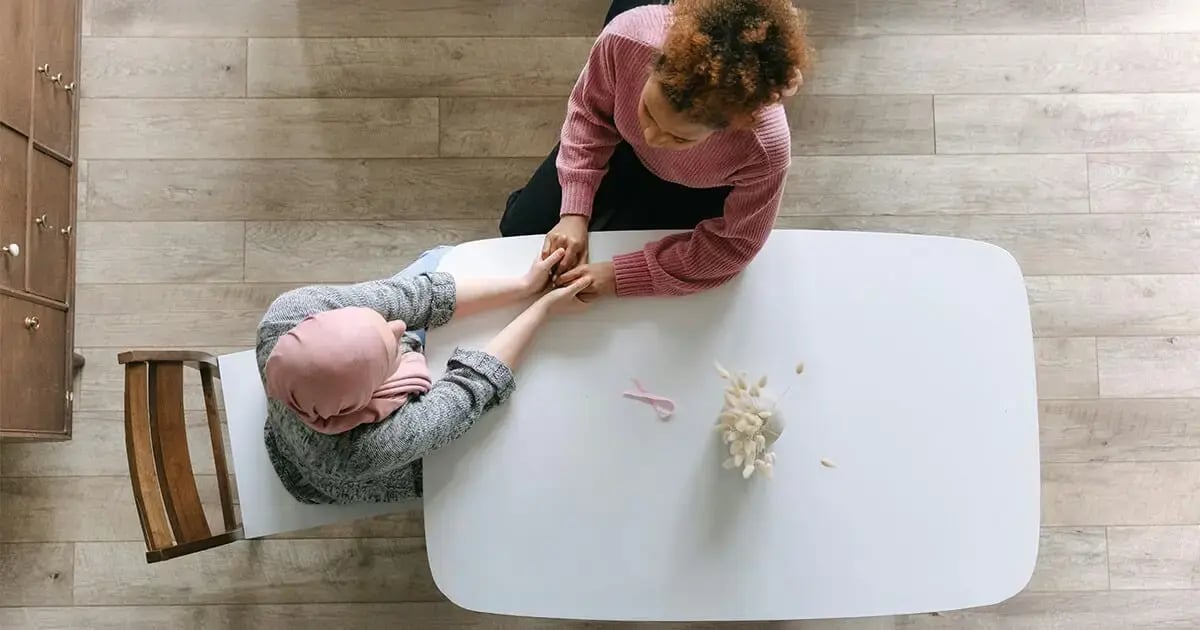Self-care despite cancer in the family - tips for your everyday life
A cancer diagnosis affects not only the individual but also their family and closest loved ones. The closer you are to the person affected, the greater the emotional and practical pressures—managing daily routines and medical appointments can feel overwhelming. In the process, your own needs can easily slip into the background. However, neglecting your own well-being does not help anyone; in fact, staying balanced yourself is essential if you want to support others. This article aims to encourage you to take self-care breaks and offers ideas for integrating healthy habits into daily life when coping with cancer.

Listen to blog post
Why do family caregivers often forgot self-care?
"Not being ill" is a privilege that we only become aware of when we are no longer ill or when people we love are no longer ill. But if we still have this privilege but our loved ones no longer do, it can also be associated with feelings of guilt - as well as the desire to share this privilege through sacrifice.
And of course, it is what makes us human beings that we care for those to whom we feel connected. However, we must not forget that caring and self-care are not opposites, but cannot function without each other.
We know that there is often little or no time for real breaks in everyday life alongside all our obligations and caring for relatives. However, Switzerland offers numerous respite services for family caregivers. Don't be afraid to seek help.
The importance of self-care in caring for relatives
Not only do you deserve time for yourself - it's also important so that you can be there for your loved ones in the long term. If you constantly overload yourself, you run the risk of becoming ill yourself or burning out emotionally. Self-care does not mean being less there for others - rather, it ensures that you remain productive and emotionally balanced in the long term. Recovery is not just an organizational or medical process - a stress-free and loving environment contributes significantly to the well-being of sick people.
Encouraging self-care
We have already learned that self-care is not selfishness, but an important part of caring for loved ones. Nevertheless, it can be difficult to break these thought patterns.
Here's how you can change these thought patterns:
- Realize that self-care is necessary. Without breaks, you will lack the energy to care in the long term.
- Actively question your feelings of guilt. Would you expect a friend to sacrifice themselves completely? Probably not - so be fair to yourself too.
- Actively ask for support. Family, friends or professional services can help you and lighten your load.
- Plan specific recovery phases. Even short breaks, a walk or a relaxing activity will help you to recharge your batteries.
- Set yourself goals. Breaking the habit of always having to be there in person can be difficult. If necessary, start small. Start with 20 minutes of conscious self-care a day and you will soon realize that you are not only doing something good for yourself, but also for your loved ones.

Use support systems and discussion groups
Sharing experiences with other family caregivers can be an important part of self-care. Discussion groups offer the opportunity to share experiences and support each other. Professional counseling can also be helpful in developing individual strategies and receiving emotional support. There are many organizations that offer such support systems and it is worth making active use of them. At SpitexCare, the exchange with other relatives as well as daily contact with care professionals specializing in oncological care is an integral part of the offer for family caregivers of cancer patients. The Swiss Cancer League offers chat groups and detailed information material for carers and other relatives.
 Yvonne Prokoph is not responsible for the content of this blog post.
Yvonne Prokoph is not responsible for the content of this blog post.
Integrating healthy habits into everyday life
In addition to planned time out for self-care, healthy habits also make a significant contribution to your own health and well-being. These include a balanced diet, regular physical activity and sufficient sleep. This may all sound obvious, but it is no longer the case when life changes as drastically as it does after a cancer diagnosis.
Self-care despite cancer in the family?!
Self-care is not a luxury, but a fundamental necessity. If you take yourself seriously and look after your own well-being, you can also help others better. Accepting support, planning breaks and sharing experiences with others all help to reduce stress and make your own efforts more sustainable. Self-care is good for your own wellbeing and the wellbeing of the people you love.


